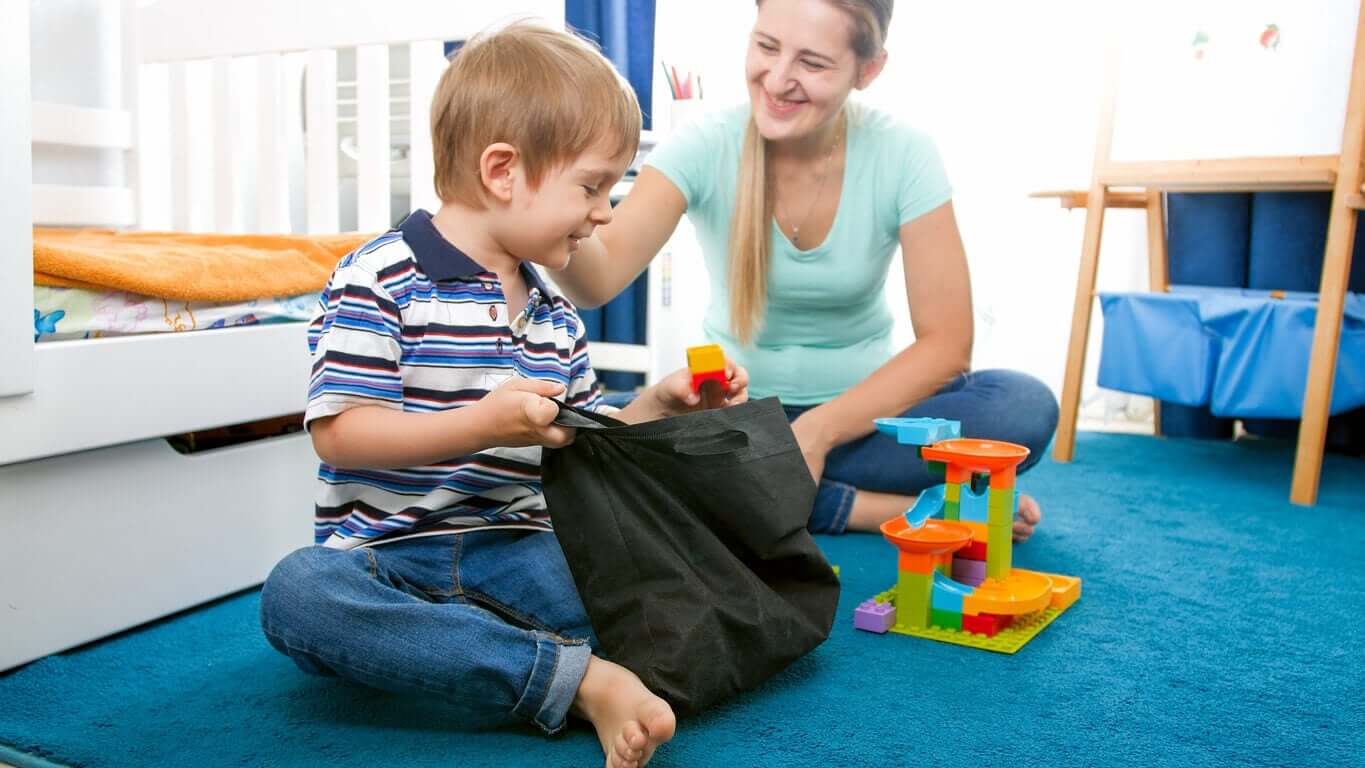When Your Child Doesn't Want Responsibilities

Many parents complain that their children are lazy, that they don’t collaborate with the housework, and that sometimes, they don’t even fulfill their school obligations. These types of attitudes are worrisome, as childhood is a stage of preparation for adult life. If your child doesn’t want responsibilities now, they won’t know how to assume them when the time comes.
What can we do to reverse this situation? We’ll tell you about it in the following lines.
Responsibility is related to parenting
It’s necessary that we emphasize that responsibility is a fundamental value to living in society and that it must be instilled from the first years of life.
It’s true that there are children who, naturally, are more organized and orderly than others. However, permissive parenting is often the basis on which the irresponsibility of minors develops.
If you’ve always done the tasks for your child, you can’t expect that from one day to the next they’ll start doing things on their own without resisting. True? Still, it’s never too late to make changes and we’re going to teach you how to make it happen.
How to act if your child doesn’t want responsibilities?
The measures to be implemented depend on the age of your child and their degree of maturity. For example, with little ones, you have to exercise greater supervision and opt for fun and playful actions. At the same time, with older kids, you’ll need to refer to personal responsibility.
Next, we’ll share some suggestions that can be of great help to you. Take note!
1. Tell them clearly what you expect of them

Children need to know what’s expected of them in order to meet these goals. Phrases like “you never do anything” or “you need to start helping out” are ambiguous instructions.
Instead, clearly set out a list of issues for each of you to take care of. This may include grooming, homework, cleaning the house, or preparing meals. Remember that everything depends on the age and level of maturity of each minor.
2. Involve them in decision making
All humans are much more willing to collaborate if we’re treated with respect and included in the team.
In this sense, instead of giving orders to your children and assigning them responsibilities unilaterally, you can meet as a family and agree on who will take care of each task. This also allows each member to choose the one they like the most or the one they do best.
By participating in household decisions, your little ones will be less resistant to fulfilling their responsibilities.
3. Use positive reinforcement, but don’t bribe them
Reinforcing the appropriate behaviors of children is always beneficial, which is also true when it comes to adults. But beware, this is very different from bribery.
If your children are young, they can receive a sticker for each task completed to motivate themselves. If they’re older, simply hearing your appreciation makes them feel validated and proud.
The reinforcements are diverse, but avoid paying them for chores or promising them material gifts in exchange for fulfilling their obligations. This reduces the intrinsic motivation of the work and makes them become dependent on the reward.
4. Help them adopt certain habits
Establishing habits at home allows what needs to be done to get done, without having to go after your children to remind them of their tasks.
If minors internalize that on Tuesdays they should take out the garbage and wash the dishes at night, or that after having a snack they have to do their homework, they’ll include these activities as part of their routine.
This is much more efficient than waiting for collaborations to happen spontaneously and without a set order.
5. Allow them to experience the consequences of their actions
Responsibility isn’t a value that parents want to impose capriciously–it’s a fundamental part of life. Therefore, the best way for children to acquire it is in a real environment.
Avoid doing things for your children that they should do for themselves: If they do not tidy or clean their room, they’ll live in a chaotic and unpleasant environment. If they don’t do their homework, they’ll get poor grades and be held accountable in class.
If in the face of their passivity, you tidy their room yourself or do their homework for them, you’ll prevent them from suffering the discomfort of such educational consequences and nothing will change.
6. Teach them that rights come with duties (and that privileges are earned)

Finally, remind your children that rights are always accompanied by duties. That is, the mere fact that they live in a home and are part of a family means that all members have to collaborate for its proper functioning.
In the same way that adults have their work, minors have the obligation to study and train for life. And they have to comply with their responsibilities.
At the same time, beyond the basic issues, they must earn things for themselves. For example, in order to access a new game console, they’ll have to save money, and if they want to go out with their friends for more hours, they’ll have to show responsibility and maturity first.
If your child doesn’t want responsibilities, act fast!
If you’re a permissive mother, you may not have given enough importance to the fact that your child doesn’t want to assume their responsibilities. However, this is a major red flag that you’re not preparing them well for life.
Encouraging autonomy and raising decisive and autonomous people is one of the pillars of education in the home. Therefore, set out to make a change today.
Your child is likely to resist at first, especially if they haven’t had to be responsible for many years. But keep in mind that, in the long term, this will be the best gift, because you’ll save them a lot of suffering in their future life.
Many parents complain that their children are lazy, that they don’t collaborate with the housework, and that sometimes, they don’t even fulfill their school obligations. These types of attitudes are worrisome, as childhood is a stage of preparation for adult life. If your child doesn’t want responsibilities now, they won’t know how to assume them when the time comes.
What can we do to reverse this situation? We’ll tell you about it in the following lines.
Responsibility is related to parenting
It’s necessary that we emphasize that responsibility is a fundamental value to living in society and that it must be instilled from the first years of life.
It’s true that there are children who, naturally, are more organized and orderly than others. However, permissive parenting is often the basis on which the irresponsibility of minors develops.
If you’ve always done the tasks for your child, you can’t expect that from one day to the next they’ll start doing things on their own without resisting. True? Still, it’s never too late to make changes and we’re going to teach you how to make it happen.
How to act if your child doesn’t want responsibilities?
The measures to be implemented depend on the age of your child and their degree of maturity. For example, with little ones, you have to exercise greater supervision and opt for fun and playful actions. At the same time, with older kids, you’ll need to refer to personal responsibility.
Next, we’ll share some suggestions that can be of great help to you. Take note!
1. Tell them clearly what you expect of them

Children need to know what’s expected of them in order to meet these goals. Phrases like “you never do anything” or “you need to start helping out” are ambiguous instructions.
Instead, clearly set out a list of issues for each of you to take care of. This may include grooming, homework, cleaning the house, or preparing meals. Remember that everything depends on the age and level of maturity of each minor.
2. Involve them in decision making
All humans are much more willing to collaborate if we’re treated with respect and included in the team.
In this sense, instead of giving orders to your children and assigning them responsibilities unilaterally, you can meet as a family and agree on who will take care of each task. This also allows each member to choose the one they like the most or the one they do best.
By participating in household decisions, your little ones will be less resistant to fulfilling their responsibilities.
3. Use positive reinforcement, but don’t bribe them
Reinforcing the appropriate behaviors of children is always beneficial, which is also true when it comes to adults. But beware, this is very different from bribery.
If your children are young, they can receive a sticker for each task completed to motivate themselves. If they’re older, simply hearing your appreciation makes them feel validated and proud.
The reinforcements are diverse, but avoid paying them for chores or promising them material gifts in exchange for fulfilling their obligations. This reduces the intrinsic motivation of the work and makes them become dependent on the reward.
4. Help them adopt certain habits
Establishing habits at home allows what needs to be done to get done, without having to go after your children to remind them of their tasks.
If minors internalize that on Tuesdays they should take out the garbage and wash the dishes at night, or that after having a snack they have to do their homework, they’ll include these activities as part of their routine.
This is much more efficient than waiting for collaborations to happen spontaneously and without a set order.
5. Allow them to experience the consequences of their actions
Responsibility isn’t a value that parents want to impose capriciously–it’s a fundamental part of life. Therefore, the best way for children to acquire it is in a real environment.
Avoid doing things for your children that they should do for themselves: If they do not tidy or clean their room, they’ll live in a chaotic and unpleasant environment. If they don’t do their homework, they’ll get poor grades and be held accountable in class.
If in the face of their passivity, you tidy their room yourself or do their homework for them, you’ll prevent them from suffering the discomfort of such educational consequences and nothing will change.
6. Teach them that rights come with duties (and that privileges are earned)

Finally, remind your children that rights are always accompanied by duties. That is, the mere fact that they live in a home and are part of a family means that all members have to collaborate for its proper functioning.
In the same way that adults have their work, minors have the obligation to study and train for life. And they have to comply with their responsibilities.
At the same time, beyond the basic issues, they must earn things for themselves. For example, in order to access a new game console, they’ll have to save money, and if they want to go out with their friends for more hours, they’ll have to show responsibility and maturity first.
If your child doesn’t want responsibilities, act fast!
If you’re a permissive mother, you may not have given enough importance to the fact that your child doesn’t want to assume their responsibilities. However, this is a major red flag that you’re not preparing them well for life.
Encouraging autonomy and raising decisive and autonomous people is one of the pillars of education in the home. Therefore, set out to make a change today.
Your child is likely to resist at first, especially if they haven’t had to be responsible for many years. But keep in mind that, in the long term, this will be the best gift, because you’ll save them a lot of suffering in their future life.
All cited sources were thoroughly reviewed by our team to ensure their quality, reliability, currency, and validity. The bibliography of this article was considered reliable and of academic or scientific accuracy.
- Ryan, R., & Deci, E. L. (2000). La Teoría de la Autodeterminación y la Facilitación de la Motivación Intrínseca, el Desarrollo Social, y el Bienestar. American Psychologist, 55(1), 68-78.
- Llerena González, P. M. (2016). El estilo de la crianza permisiva y la realización de las tareas escolares de los niños y niñas de 4 a 5 años de edad de la Unidad Educativa Bilingüe CEBI del cantón Ambato provincia de Tungurahua (Bachelor’s thesis, Universidad Tècnica de Ambato. Facultad de Ciencias Humanas y de la Educaciòn. Carrera de Parvularia).
This text is provided for informational purposes only and does not replace consultation with a professional. If in doubt, consult your specialist.








